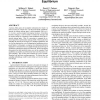276 search results - page 43 / 56 » A control theoretic approach to noncooperative game design |
AMEC
2003
Springer
14 years 23 days ago
2003
Springer
Auctions define games of incomplete information for which it is often too hard to compute the exact Bayesian-Nash equilibrium. Instead, the infinite strategy space is often popu...
CSE
2009
IEEE
14 years 2 months ago
2009
IEEE
—The hidden knowledge in social networks data can be regarded as an important resource for criminal investigations which can help finding the structure and organization of a crim...
EOR
2008
13 years 7 months ago
2008
The Cooperative Water Allocation Model (CWAM) is designed within a general mathematical programming framework for modeling equitable and efficient water allocation among competing...
SOUPS
2005
ACM
14 years 1 months ago
2005
ACM
In our research, we have been concerned with the question of how to make relevant features of security situations visible to users in order to allow them to make informed decision...
CHI
2007
ACM
14 years 8 months ago
2007
ACM
Sensors are becoming increasingly important in interaction design. Authoring a sensor-based interaction comprises three steps: choosing and connecting the appropriate hardware, cr...

